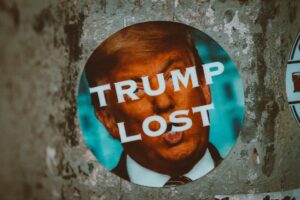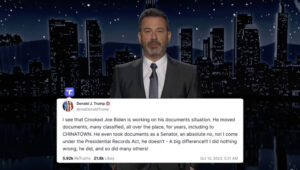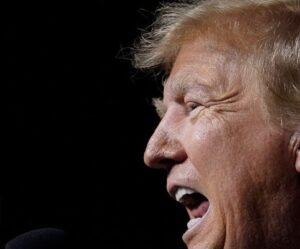
When you make purchases through our links we may earn a small commission.

Photo Credit: Trump Did That
🇺🇸 Support us on Patreon for only $1.99 a month 🇺🇸
🍻 Join us on Facebook @TheSmokingChair 🍻
Former President Donald Trump’s tenure in the Oval Office was marked by controversy, bold assertions, and a distinctive approach to governance. Among his many eyebrow-raising statements and actions, one particular belief stands out: his assertion that classified documents belong to him, not to the American public. This assertion challenges the fundamental principles of transparency and accountability that underpin democratic governance and raises significant concerns about the handling of sensitive information.
Throughout his presidency, Trump exhibited a penchant for secrecy and a disdain for traditional norms of government transparency. He frequently clashed with intelligence agencies and dismissed the conclusions of their assessments, often publicly undermining their credibility. Trump’s reluctance to disclose information extended to his personal dealings, as evidenced by his refusal to release his tax returns—a longstanding tradition among presidential candidates.
However, it was Trump’s attitude towards classified documents that perhaps most starkly illuminated his belief in their personal ownership. During his time in office, Trump reportedly had a cavalier attitude towards handling classified information, raising concerns about potential breaches of national security protocols. Several instances underscored this disregard for established procedures, including his alleged sharing of classified intelligence with foreign officials and his use of personal electronic devices for official communications, potentially exposing sensitive information to hackers.
Trump’s assertion of personal ownership over classified documents is rooted in his broader worldview, which emphasizes individual authority and personal privilege over institutional norms. Throughout his career, Trump has cultivated an image of himself as a singularly powerful figure, accustomed to operating by his own rules and beholden to no one. This mindset, combined with his aversion to accountability, may have contributed to his belief that classified documents are essentially his property.
Critics argue that Trump’s attitude towards classified information reflects a dangerous disregard for the principles of government transparency and accountability. In a democracy, the public has a right to access information about the actions and decisions of their elected leaders, particularly when those decisions have implications for national security. Classified documents are intended to protect sensitive information, not to shield public officials from scrutiny or accountability.
Moreover, Trump’s assertion of personal ownership over classified documents raises troubling questions about the potential misuse of presidential power. If a sitting president believes that classified information is his personal property, it could embolden him to use that information for personal or political gain, rather than for the public good. Such behavior undermines the integrity of the office and erodes public trust in government institutions.
The implications of Trump’s belief extend beyond his own presidency, serving as a cautionary tale about the dangers of unchecked executive authority. While every president grapples with the tension between national security imperatives and the public’s right to know, Trump’s approach represents an extreme departure from established norms. It highlights the importance of robust oversight mechanisms and a commitment to upholding democratic principles, even—and perhaps especially—in the face of executive overreach.
Moving forward, it is essential for policymakers, journalists, and the public to remain vigilant in safeguarding the principles of government transparency and accountability. The notion that classified documents belong to the president, rather than to the American people, is a dangerous distortion of democratic governance. By holding public officials accountable for their actions and demanding transparency in government operations, we can uphold the integrity of our democratic institutions and ensure that power remains vested in the hands of the people, where it rightfully belongs.
Content Continues Below
SHARE
RECOMMENDED FOR YOU:
Financing Universal Basic Income: A Comprehensive Approach
You’ll get more articles like this – and our favorite promotional offers delivered straight to your inbox.
By submitting this form you agree to our terms and conditions. You can unsubscribe at any time.

GFYG: MarieMur – Sexy Lingerie Try On Haul!



NAUGHTY CHRISTMAS LINGERIE TRY-ON HAUL *HOT* | Lauren Alexis

Dollar Stores: Last Week Tonight with John Oliver (HBO)

Fake News Alert: Trump’s Latest Election Fraud Spin









































